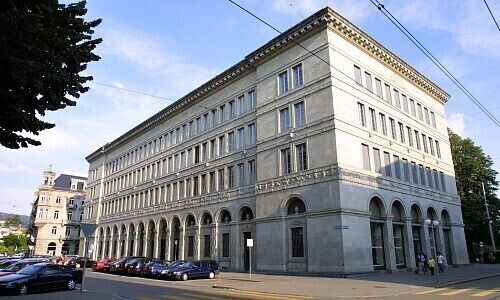The governing board faces an almost impossible decision after six and a half years without changing interest rates. Being too soon or too late.
The sweat, at least figuratively, is likely palpable in the Bern and Zurich offices of the Swiss National Bank (SNB) right now. Last week, the unexpectedly high US inflation of 8.6 percent in May prompted very significant dislocations in the financial markets. Investors ostensibly fear that the worst inflation number seen in 40 years will unavoidably prompt much larger increases in interest rates - and lead directly to a recession.
Fed Takes a Stand
At the Federal Reserve (Fed) meeting this Wednesday, economists are unanimous that the North American central bankers will decide to raise rates. Some say it will be by 0.5 percent, while others predict as much as a 0.75 percent increase. All of this has driven the dollar higher and it is now almost reached parity with the franc.
In the Eurozone, inflation has reached the same heights, but the interest rate cycle lags that of the US and UK. European Central Bank President Christine Lagarde's team did finally pivot last Thursday, indicating plans to increase them during the meeting in July. A further, larger step is expected by the end of the year, probably in September.
First Increase in More Than Six Years?
On Thursday it will be the SNB's turn to make its decision on interest rates. Domestically, economists agree on two things. The central bank does now have the leeway to do something earlier than had been originally expected. But they won't be taking the first step before September. Interest rates have been unchanged since January 2015.
UBS's team of economists predicts that the SNB will raise rates by 50 basis points in September and another 25 basis points in December. That means that the era of negative interest rates should come to a full stop at the end of the year. But the UBS experts also maintain the level of uncertainty will remain high. The Ukraine war could escalate, there could be a gas embargo, a European-wide recession, and further market turbulence. All these could change the ECB's policies massively, they indicate.
There is little point in raising interest rates prematurely in Switzerland given the domestic inflation rate is far lower than it is in surrounding countries.
Too Optimistic
Economists at other banks point to the low Swiss inflation rate and also infer a first increase in interest rates in September. Inflation was 2.9 percent in May and the SNB follows a medium-term target to keep prices stable by managing inflation in a band between zero and 2 percent.
Most of the attention will be on the forecast of future inflationary trends. In March, the SNB was still relatively optimistic. Increases in energy prices were seen as temporary and there was little evidence they were having secondary impacts. Inflation was seen staying at 2.1 percent this year, and falling to 0.9 percent in 2023 and 2024.
The massive increases in inflation rates abroad have let doubt creep into those forecasts. Even SNB chair Thomas Jordan has publicly declared that foreign interest rates need to be part of the central bank's overall assessment. Thomas Stucki, the investment head of St. Galler Kantonalbank, says it is clear that the SNB will react to the higher inflationary pressure.
Franc Is Not That High After All
The SNB's assessment also looks at how high the franc is. It originally rose against the euro after the invasion of Ukraine but has since settled at 1.04 and 1.05. All the statements released last year indicated that the franc was expensive. It was only the statement made in March that deviated from what was then said significantly.
Jordan then believed that the SNB could take the nominal increase in stride given the large differences being seen between Swiss and euro-zone inflation. The currency's high level also helped to partly cushion any blows from high inflation.
Waiting for September
UBS believes it is time for the SNB to stop talking about the franc's strength in order to prepare for what will be an inflection point for interest rates. Much of that is because the argument of keeping the franc strong served as a way to justify its expansionary monetary policy.
After the activity subsides in wake of the Fed's decision on Wednesday evening, attention in Switzerland will focus on two things. The prognosis for inflation and how high the franc is against the country's major trading partners. Both those things will provide important clues about the development of interest rates over the next two quarters.
Given the large uncertainty still out there, particularly related to Ukraine, many believe the SNB is likely to act cautiously. All the economists agree on that. Or as UBS writes: «It would do the SNB well to wait for September».

































